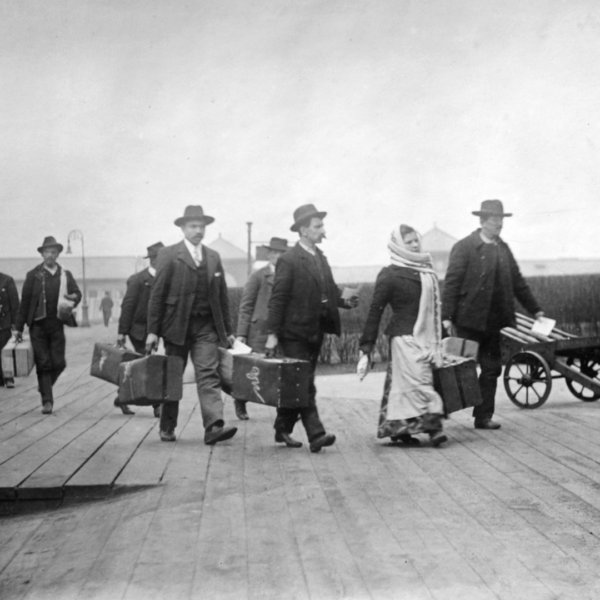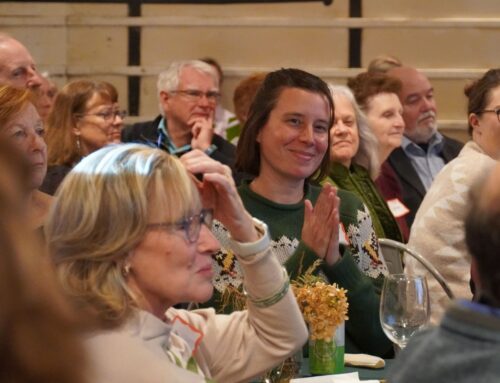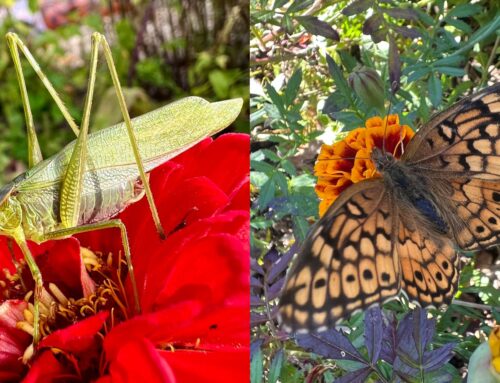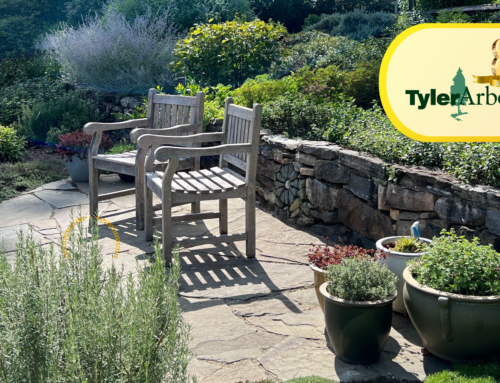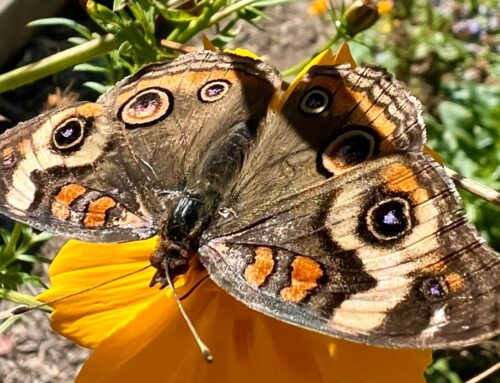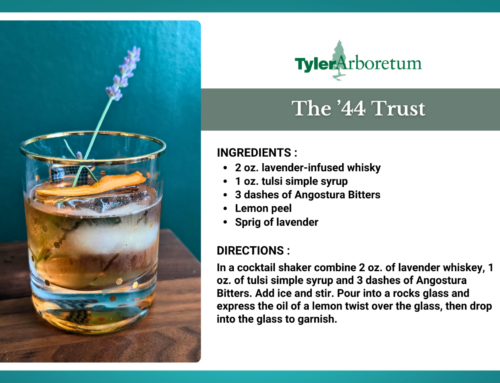Winter has come over the land. The gardens have gone to bed, and the tree branches are bare against a blue December sky.
The ghosts of this past season’s garden still haunt the spaces where it grew. A tattered tomato vine clings to a trellis and the shell of a bean rests empty in a bed. The plants themselves are gone, and they will not grow again.
Except for one thing. The piece of themselves left behind.
That is the purpose of a seed. The entire growth of a season – the life span of one single plant – all reduced to the absolute essentials: fat, sugar, and the genetic material of a new generation. In some ways, the weight of a seed is nothing, vanishingly small in the palm of a hand. In other ways, however, it is perhaps the heaviest thing that we carry.
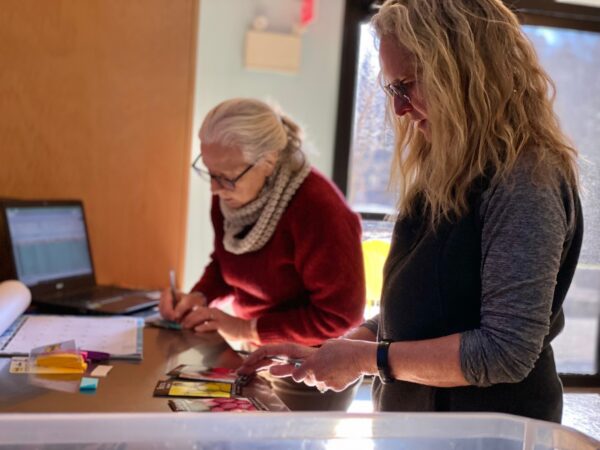
Volunteers in Lucille's Garden help prepare seed orders.
Those are my family’s stories, but they are not unique. I wonder about this as I research the seeds I plan to order. Bean ‘Hidatsa Red Indian’ and ‘Potawatomi Pole Lima.’ Names that hint at a deeper history and one that I do not know. I search for it as I consider how and where to grow these plants. Here is what I found: ‘Historic variety introduced commercially in 1915 by the Oscar Will Seed Company’. But that does not tell me who carried these beans across a nation; that does not tell me who kept these seeds when the keeping became a challenge.
Okra ‘Hill Country Red’ – stories say that enslaved Africans carried these seeds across the ocean hidden in their hair. Aunt Lou’s Underground Railroad Tomato was carried north by an unnamed man escaping slavery in the South. The choice to preserve these plants is the legacy left to us by these people whose names history has forgotten or perhaps never knew. That is the responsibility of a seed.
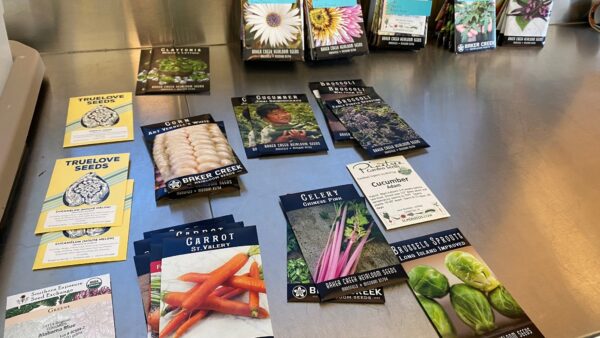
Looking to the future: seeds for 2024.
The Revolutionary Act of Growing
In some ways, gardening is a revolutionary act, and we are all rebels. If you talk to plant people, you know this to be true. I am not sure we can help it. If I notice a flower I think is beautiful, even if it is in my neighbor’s yard, I mark it in my mind to come back for seed in the fall. A tempting succulent may find a leaf pocketed to propagate at home. A houseplant discarded by the trash will almost certainly be picked up.
There’s something about life that begs to be preserved. Growing vegetables is no exception and may perhaps create the rule.
We grow because we love good food. We grow because it sustains us. We grow because it connects us to all the people who have come before us. We grow because sometimes it is the best tool we have to create resilience for our community and ourselves.
Nurturing the Legacy in Every Seed
I will order seeds in the next few weeks. Some will be familiar friends to me. Others will be new. All will come to me because of people who carried them here, across an ocean, across a country, through generations. It is my hope that I will grow them well. I hope that they will carry their legacy forward into a future full of love and joy. Regardless, they will persist. Because that is what seeds do – they carry on. Luckily for us, more often than not, they carry us with them too.
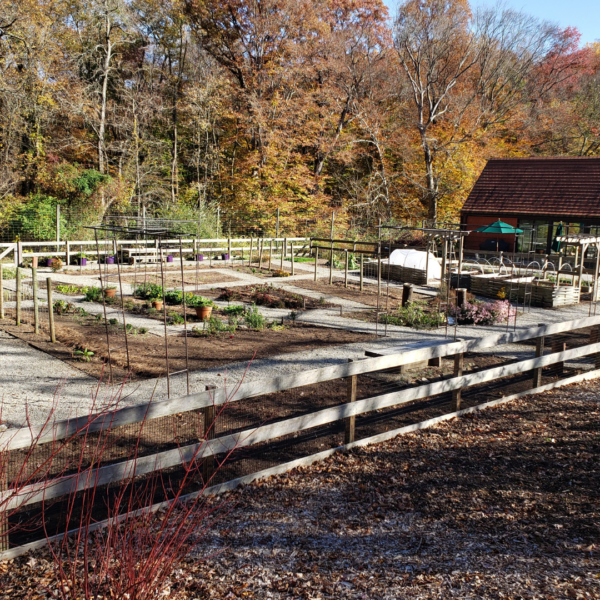
Lucille's Garden, prepped for winter.
Every Seed Tells a Story
This is what I find myself thinking of as I put together my seed orders for next season. I live in a time and a place where the seeds of the world are at my fingertips. Herbs from every culinary tradition, flowers from around the globe, and vegetables in every color of the rainbow. An embarrassment of riches that turns my thoughts back to the people and places where they come from. To the people for whom this would be a gift beyond their wildest dreams.
Potatoes – I think about them as I take apart the trellises of this past summer. Baltic Rose, Huckleberry Gold, Sarpo Miro. I can order these with the click of a button, and come May when the soil is soft, rich, and dark they will appear through the mail for me to plant. Not so for my many times great grandfather and grandmother who knew that they must save their seed potatoes for any hope of harvest in the next season. Even around them, the flowers of their potato crops bloomed above roots that were rotting and black.
Ireland, 1847: A year my grandfather, on his farm in Sweetwater, New Jersey, still called ‘Black ‘47’ even though he was never alive to see that time or those people.
What tremendous weight for a seed to carry, to wait in a cool dark root cellar against a future where the crops may not rot in the ground.
Tomatoes – in my eyes, there is no better food than a ripe tomato still warm from the sun.
I am very much like my great–great–grandmother, who carried two things with her from Italy: her mandolin and her tomato seeds.
San Marzano is the best sauce tomato from her family’s land outside of Ravena. She tucked those seeds in her bag, hidden away from the people aboard the boat who said that you could not carry plants across an ocean, and concealed from the officials in New York who searched each person who disembarked. That is the promise of a seed. A taste of home in a world where all is strange and new. A touchstone to remind ourselves that we come from somewhere. We belong.
